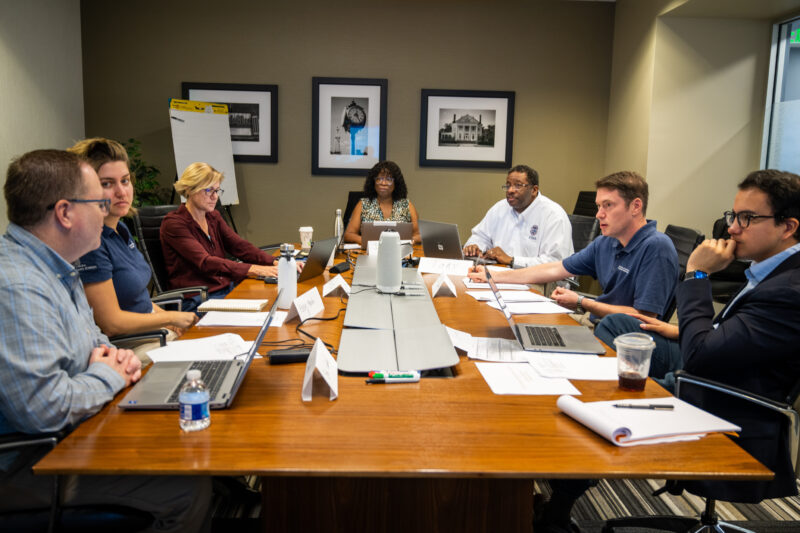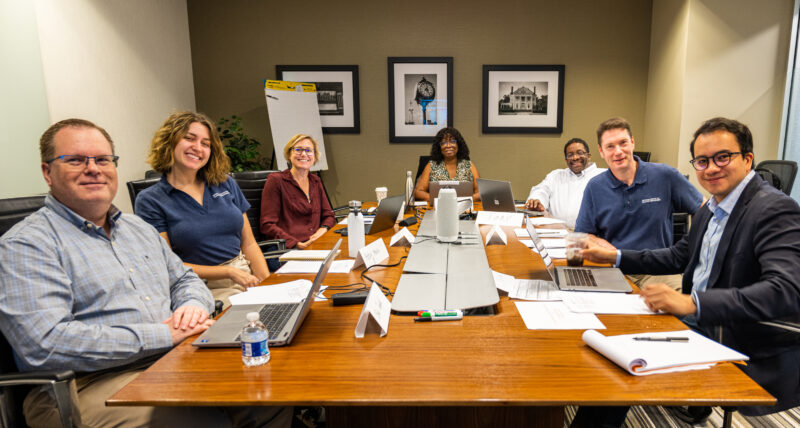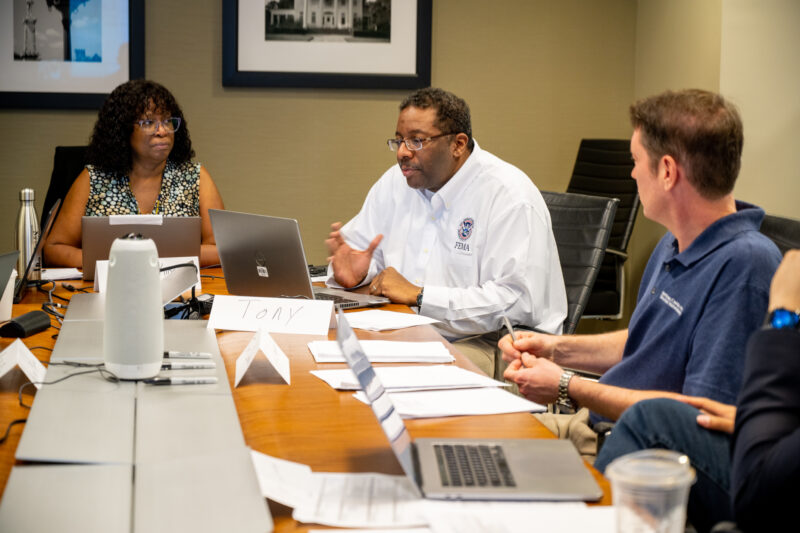Training offered with FEMA
Georgia Tech works with the National Training and Education Division of FEMA to offer course on national preparedness and resilience. The courses described below are for first responders, economic development professionals, urban and regional planners, and leaders from government, business, and higher education, and are available at no charge.
FEMA, the Federal Emergency Management Agency, is an agency of the United States Department of Homeland Security (DHS) that is responsible for coordinating the federal government’s response to natural and man-made disasters. Its primary mission is to help people and communities prepare for, respond to, recover from, and mitigate the impacts of disasters.
FEMA’s mission is to help communities become more resilient in the face of disasters and to provide aid when disasters strike. It plays a vital role in disaster management and response efforts across the United States.
Enterprise Innovation Institute (EI2) from the Georgia Institute of Technology collaborates with partners to develop relevant, training programs.
We work with and encourage collaborative problem-solving among
- community-based organizations,
- state, local, tribal, and territorial government (SLTT) leadership,
- first responders,
- economic development organizations,
- urban and regional planners,
- public health officials,
- elected officials and government representatives,
- public information officers, and
- emergency management personnel.
FEMA offers all of its training at no cost and provides valuable benefits to everyone. You will earn the FEMA certificate issued for successful completion of the course. More information about the training, as well as registration links, can be found in the sections below.
National Climate Resilience Training
The escalating frequency, consequences, and duration of extreme weather events coupled with a changing climate will reshape communities and ecosystems. Understanding and adapting to these challenges is crucial to ensuring a sustainable and secure future.
This training will address the increasing challenges posed by rising extreme weather events and climate change. The courses will equip emergency planners, managers, and responders with best practices for involving the entire community in preparedness efforts, particularly underserved and disadvantaged groups.
Operationalizing Climate Resilience for Equitable Outcomes – Equipping Leaders with Methods, Tools, and Training for a Sustainable Future
Four new instructor-led courses:
Are you ready to enhance preparedness among the whole community?
MGT-302 Integrating Climate Change and Equity into Preparedness Activities – to build preparedness strategies for climate risks
Target audience: Emergency managers, planners, and first responders (4 hours)
Is your community ready to address the impacts of climate change?
MGT-490-V Conducting Whole Community Climate Risk & Vulnerability Assessments – equipping communities to plan for climate risks
Target audience: Emergency managers, urban planners, state, local, tribal, and territorial government (SLTT) leadership, first responders, community-based organizations, economic development organizations, public health officials, councils of government, public information officers (3.5 hours)
Are you ready to implement climate resilience strategies?
MGT-493 Crisis Leadership: Resolving Climate Impacts Through Community Lifelines – equipping leaders to build resilient communities against climate risks
Target audience: Emergency managers, urban planners, state, local, tribal, and territorial government (SLTT) leadership, first responders, community-based organizations, economic development organizations, public health officials, councils of government, public information officers (6 hours)
Are you equipped to effectively communicate climate risks across the whole community?
MGT-305-W Achieving Equitable Outcomes through Effective Public Information and Warning
Target audience: Emergency managers, urban planners, state, local, tribal, and territorial government (SLTT) leadership, first responders, community-based organizations, economic development organizations, public health officials, councils of government, public information officers (4 hours)
Our Organizations have partnered under FEMA Grant No. EMW-2022- CA-0038-S01 to develop NEW COURSES and tools to raise awareness and build capacity, climate resilience, and equitable outcomes among the whole community in support of the Justice 40 Initiative.
Upcoming Courses in 2024
Coming Soon: Empowering Tribal Nations to Build Readiness and Resilience
Enhancing Tribal Nation Readiness & Resilience: Strengthening Tribal Nation Capabilities & Capacities
These classes are being developed in collaboration with Southwestern Indian Polytechnic Institute and NABEDC.com
Target Audience:
-
-
- Tribal responders,
- emergency managers,
- public health officials,
- community-based organizations,
- business leaders,
- public information officers, and
- state, local, tribal, and territorial government (SLTT) leadership
-
Coming soon: Five new instructor-led courses:
Tribal Emergency Management Best Practices: Implement emergency management program best practices and resources for tribes. (1.5 hours, in person)
Conducting Climate Risk & Vulnerability Assessments for Tribal Nations: Predict climate-related impacts; Conduct tribal nation climate risk and vulnerability assessments; Formulate climate adaptation strategies with equitable outcomes. (4 hours, in-person)
Building Tribal Community Resilience: Determine methods, resources, and practices that enhance community resilience. (6 hours, in-person)
Effective Climate Risk Communication Among Tribal Communities: Develop risk communication strategies to prepare, notify, and warn at-risk populations. (6 hours, in-person)
Creating Economic Resilience for Tribal Nations: Develop strategies to reduce disaster risks for tribal businesses and industries. (1.5 hours, in-person)
Developed under DHS/FEMA Grant No. EMW-2023-CA-05334 for NTED. www.firstrepondertraining.gov
Registration Instructions:
- Obtain a FEMA Student ID; you will need this for the course registration process
- https://cdp.dhs.gov/FEMASID to register if you do not have a FEMA SID
- Click the respective course registration links; you will need to register for each course that you are planning to attend
- If this is your first time logging into Teachable, you will need to setup an account on Teachable Learning Management System (LMS)
- Once you have an account, navigate to the course (from the home page or re-click the course link)
- On the course landing page, click “Register for Course:
- Click “Start” to begin the course introduction, review the information provided, then click “Complete and Continue”
- Download the calendar reminder
- Save to your calendar
- Fill out the FEMA Registration Form and click “Submit” when complete, then click “Complete and Continue” to navigate to the Pre-course test/assessment.
- Complete the Pre-course Test and click “Submit”, then “Complete and Continue” to navigate to the Participant Guide.
- Download the Participant Guide, slides, and any course specific resources (e.g., exercise manual, disaster risk reduction tool, etc.).
- Click “Complete and Continue”
- After completing the course, log in to the course again to complete the following:
- Course and instructor evaluation
- Post-course Assessment
- Receive your certificate of completion




